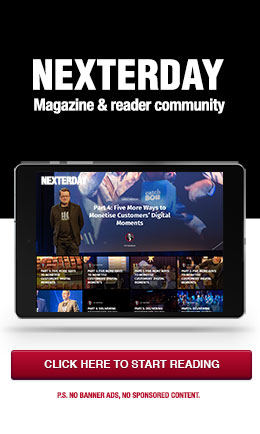Posted: February 24th, 2012 | Author: OSS Team | Filed under: Around the World | Tags: Africa, analytics, APAC, CSP, customer experience, MEA, Middle East, mobile broadband, real-time, roaming, survey, TelecomAsia | No Comments »
Microsperience…
First Touch, Last Touch, Every Touch
Analyst Teresa Cottam explains why every interaction that takes place between a communications service provider (CSP) and a customer is important. The CSP often perceives the first touch, or first customer engagement to be a sales transaction where it signs up a customer to receive a service. However, customers believe that their relationship with a CSP doesn’t just begin with a simple sale—it takes a longer period of time to cultivate.
Teresa uses a personal experience with an old broadband operator to explain how CSPs should build better relationships with customers. After mishandling her service transfer process, the operator made her wait 30 minutes on the phone, and a support assistant accused her of signing up for the wrong package and dismissed her concerns.
Teresa says this example emphasises issues that currently exist in the market, and proves that CSPs need the ability to analyse data in real time to get a better understanding of and retain their customers. CSPs need to focus on not just the first touch but any and every touch in order to build loyalty. She also notes that in today’s competitive market, even forgetting that ex-customers could be future customers is a missed revenue opportunity and could hinder CSPs’ success.
telecomasia.net…
APAC Telcos Concentrate on Quality
Joseph Waring gives an overview of a recent Telecom Asia-Ovum survey of telecom executives in 19 countries across Asia Pacific. The results revealed quality of service (QoS) to be the key distinguishing feature for operators in the region.
Interestingly, the survey also found that fewer respondents (38% compared to 54% two years ago) viewed unlimited data rates as the most effective way to charge for mobile broadband services. But Ovum analysts believe that the percentage of people who agree with this method is still too high, and urges operators to steer away from flat rates, which can over-burden networks and negatively impact QoS.
Additionally, survey respondents indicated that they believe video will be the key driver of continued mobile broadband traffic growth in Asia Pacific. Like Comptel, Ovum believes that operators must look to balancing the management of resources like bandwidth, while controlling customers’ data services, in order to maximise the customer experience and monetise their offerings.
CommsMEA…
Right Path for Roaming?
Industry experts wonder if recent Gulf Cooperation Council (GCC) regulations could potentially cause more harm than good. These called for telecom operators to slash mobile phone roaming charges to consumers by at least 50 percent beginning 1 February in a bid to bring costs in line with those in Europe. Roaming revenues account for a significant proportion of overall profits for many CSPs, and a sudden forced reduction in tariffs may, unfortunately, lead to price increases, less investment in other areas and other unintended consequences.
But, there is evidence that Gulf operators are already moving in the right direction towards decreasing roaming tariffs without the regulations. Peter Lyons, director of spectrum policy, Africa & Middle East for the GSM Association (GSMA), says that operators responding to the competition are driving roaming costs down and that they are making an effort to increase the transparency of roaming rates. On the other hand, some point out that regulation is needed to protect against distortions in the market that can be created by dominant players. What do you think is the right path for the Gulf in terms of roaming?
Posted: January 12th, 2012 | Author: OSS Team | Filed under: Around the World | Tags: 2012, APAC, Asia-Pacific, broadband, customer experience, M2M, mobile, network capacity, network optimisation, OSS/BSS, policy control, predictions, TelecomAsia | No Comments »
Informa Telecoms and Media Blog…
12 Top OSS/BSS Trends for 2012
Analyst Peter Dykes highlights an exciting outlook for the OSS/BSS sector in 2012. He predicts that the growing requirement for more complex rating and billing functionality will open up opportunities for vendors, and says that improvements in this area are necessary for operators embracing LTE. For 2012, he also believes that in both mature and emerging markets, there will be a greater focus on areas such as customer experience, business intelligence and innovation in handling network congestion.
The predictions Comptel believe are particularly interesting include the rise in demand for OSS tailored to M2M services, which Steve Hateley recently wrote about, and the growth of policy-based online charging (OLC) as operators seek to offer more innovative services. What 2012 prediction do you think is most surprising?
Telecomasia.net…
Five New Challenges for APAC Telecoms in 2012
Ovum analyst David Kennedy believes that tightening margins and streamlining business processes will be the main theme for the Asia-Pacific telecoms industry, as overall growth in the mobile market slows and competition for customers increases. David believes these five trends will drive the market forward in the region in 2012:
- The push for cost optimisation and efficiency – this will grow in importance due to increasing competition and margin pressures.
- The importance of customer service – operators will work to stay ahead of the competition with promotions, marketing, better network convergence/reliability, etc.
- The future of smart devices and mobile app ecosystems – successful devices will need to integrate applications, content and services into the platform.
- Network data management importance– as data surges, operators are being forced to alleviate network congestion and will roll out a combination of solutions including more LTE networks and Wi-Fi offloading.
- Bundling for customer retention – more bundling is expected to emerge for mobile-only and second-tier operators.
Do you agree that these trends will define the APAC telecoms industry in 2012 and ensure continued profitability and improved efficiency?
Telecoms.com…
Mobile Network Predictions for 2012
In 2012, the mobile market will see two key trends emerge: technologies critical to maintaining a high user experience and initiatives providing additional profit growth opportunities while reducing costs. In an effort to improve the customer experience and increase revenues, operators are looking to invest in network sharing and traffic optimisation.
Another major issue in 2012 will be coverage for LTE networks, most notably in markets where operators only have access to high frequency spectrum. LTE femtocells are predicted to boom in popularity, which will benefit residential, business and public hotspots. However, deployment of LTE small cells for capacity improvements is not expected to be widespread in 2012.
Additionally, investing in traffic optimisation for video is a hot topic, with content providers, CDNs and other vendors, and mobile operators debating various ways to deliver mobile content efficiently. We’re looking forward to seeing mobile innovations in action at the upcoming London Olympics, where operators are expected to showcase the successes of their technologies.
Posted: February 17th, 2011 | Author: Olivier Suard | Filed under: Events | Tags: Comptel, Light Reading, mobile, Mobile World Congress, tablet, TelecomAsia | 3 Comments »
Another Mobile World Congress is over! I have to confess that I say this with a great deal of relief. I am not sure I could have survived one more day of long hours, wall-to-wall meetings, noise, artificial light, irregular (and often missed) meals and lack of sleep!
That said, this year’s event has been truly fantastic for Comptel. Our expectations were very high, but they were easily exceeded. Not only did the vast majority of our pre-set meetings happen, but many very positive unplanned and ad-hoc meetings also took place . Furthermore, unlike many events that contain “world” in their names, this event can genuinely claim to be global. We met operators and partners from all over the globe.
Unfortunately, I didn’t get much opportunity to walk around the exhibition halls. However, one thing I did notice (in addition to the omnipresence of Android) is that tablet computers are taking off big time. New models were on display at a number of booths, and many of the sales people trying to convince me to invest in their fabulous events or publications used tablet computers to present their compelling arguments. This is obviously an interesting development for the mobile industry, not least for operators who need to provide and manage the bandwidth necessary to connect all of those devices to the ‘net. Bigger screens mean more data traffic, of course. Interestingly though, I heard from IDC analyst Elisabeth Rainge that the majority of tablet connections are through Wi-Fi rather than mobile networks; in other words, tablets are more of a nomadic tool than a truly mobile one.
As for the highlight of the event for me? It could have been the Light Reading Speed Dating event, which was a great deal of fun, and very useful at the same time. But on balance, I think it was watching England’s Arsenal football team play the mighty Barcelona team in a local bar last night. I can still see the looks TelecomAsia editor Joseph Waring and I got from locals, when we punched the air with delight as Arsenal overturned the Barcelona lead to win 2-1!
Great game, great show!





